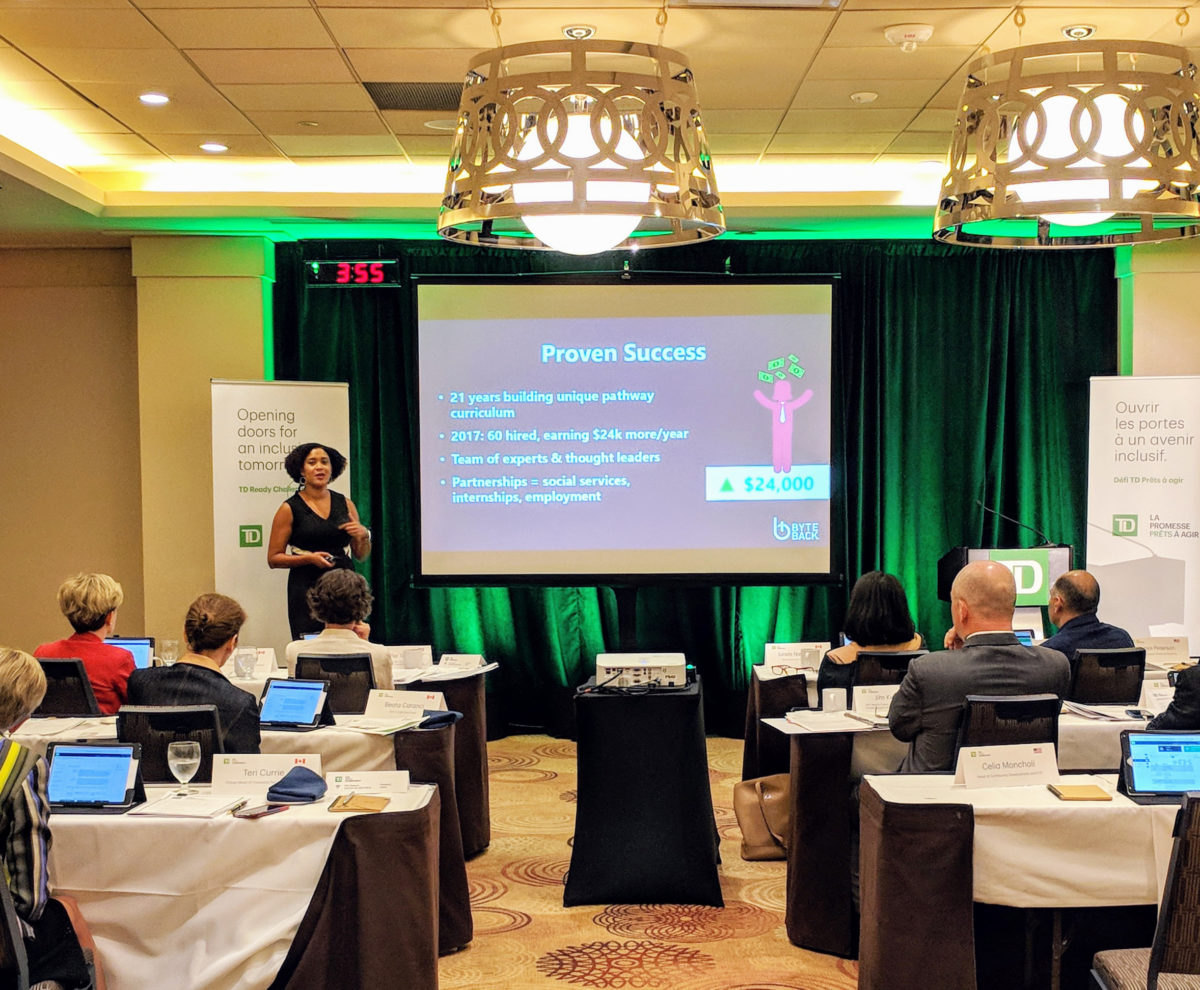Tech training nonprofit Byte Back is losing its CEO next month: Elizabeth Lindsey is leaving the NoMA-based org after five-and-a-half years to lead national youth development nonprofit Urban Alliance.
The 2019 Root 100 list honoree and 2019 Technical.ly Awards nominee for Impact Leader of the Year told Technical.ly on Monday that she’s not leaving the area, as Urban Alliance is also based in the District, near Dupont Circle. She also plans to continue to be involved with Byte Back in some capacity, including as a continuing donor and volunteer.
Lindsey’s last day with Byte Back is April 2. A search is currently underway for a new CEO, led by the Byte Back board of directors alongside D.C.-based search firm NonprofitHR.
Byte Back offers training in computer skills and prep for CompTIA certifications, such as IT Fundamentals and A+, to low-income residents of both D.C. and Baltimore. It launched in the latter city through an expansion in 2019.
Lindsey said she wasn’t looking to leave the org when she was approached by Urban Alliance about the CEO role.
“I have absolutely loved every second of the past five years of Byte Back,” she said. This move is “really about timing and it’s really about the fact that Urban Alliance is such a phenomenal organization, and I have wanted to run a larger organization for a while. So, this was an opportunity I couldn’t pass up.”
There’s certainly overlap between the two orgs — namely, their mutual focus on economic empowerment for under-resourced communities through skills development. But it’s a change in demographics served: The 25-year-old Urban Alliance focuses on high school students, while the 24-year-old Byte Back focuses on adult learners. Urban Alliance is also three times bigger, with more than $10 million in assets in 2019 compared to Byte Back’s $2.7 million, and it’s in twice as many cities: Chicago, Detroit, Baltimore and the DMV region.
Lindsey’s goals for Urban Alliance include building more partnerships with employers to connect students interested in moving from high school to career, including tech employers.
“I’m really passionate about work that supports diverse communities and moving into living-wage careers, and being able to economically thrive,” she said. “I’m a first-generation college student, I grew up in a very financially unstable family, and I’ve dedicated my entire life to supporting folks to get the same kinds of educational and career opportunities that I’ve had.” Many of the students she’ll be working with at Urban Alliance will be first-generation college students, too. And they’ll be interested in pursuing tech careers.

Byte Back Executive Director Elizabeth Lindsey presenting at the TD Ready Challenge in Toronto in September 2018. (Courtesy photo)
In Lindsey’s time at Byte Back, over 250 people have graduated from its programs, and make an average of $20,000 more than before their training, Lindsey said. In 2018, the org earned its first national funding, including a WeWork Creator Award and a TD Ready Challenge grant to fund its Baltimore expansion. It has become a leader in the conversation on hiring nontraditional technologists and bringing all levels of tech training to underrepresented groups, especially communities of color.
“Since COVID hit, people now are recognizing that the digital divide is real, that the digital divide is absolutely something that we absolutely need to address if we care about equality,” Lindsey said. “I think that in the D.C. area, and across the country, there still remains confusion about what the digital divide really is” — for instance, assuming it’s about helping people enroll in IT training or coding bootcamps. “So there’s still a lack of information and understanding about the fact that there are many adults who don’t have foundational computer skills. They don’t have a computer at home. They don’t have broadband.”
These people have been left out of the “digital economy,” she said, as well as training opportunities. That’s where foundational computer training comes in — and why cuts to funding for digital literacy programs, which D.C. government enacted for Fiscal Year 2021, hurt.
“I really hope moving forward that D.C. government really understands the need for foundational technical skills training for D.C. residents, and especially for D.C. residents who live in Ward 7 and 8, and I hope some of that funding gets reinstated,” she said.
Lindsey has a word of farewell to #dctech: Its diversity is its strength.
“I have absolutely loved being part of the D.C. tech community,” she said. “I have learned so much from this community. I think that the tech sector still has a long ways to go in diversity, and I think the D.C. tech community is really strong and really diverse.”
Join our growing Slack community
Join 5,000 tech professionals and entrepreneurs in our community Slack today!
Donate to the Journalism Fund
Your support powers our independent journalism. Unlike most business-media outlets, we don’t have a paywall. Instead, we count on your personal and organizational contributions.

Maryland firms score $5M to manufacture everything from soup to nanofiber

National AI safety group and CHIPS for America at risk with latest Trump administration firings

How women can succeed in male-dominated trades like robotics, according to one worker who’s done it


